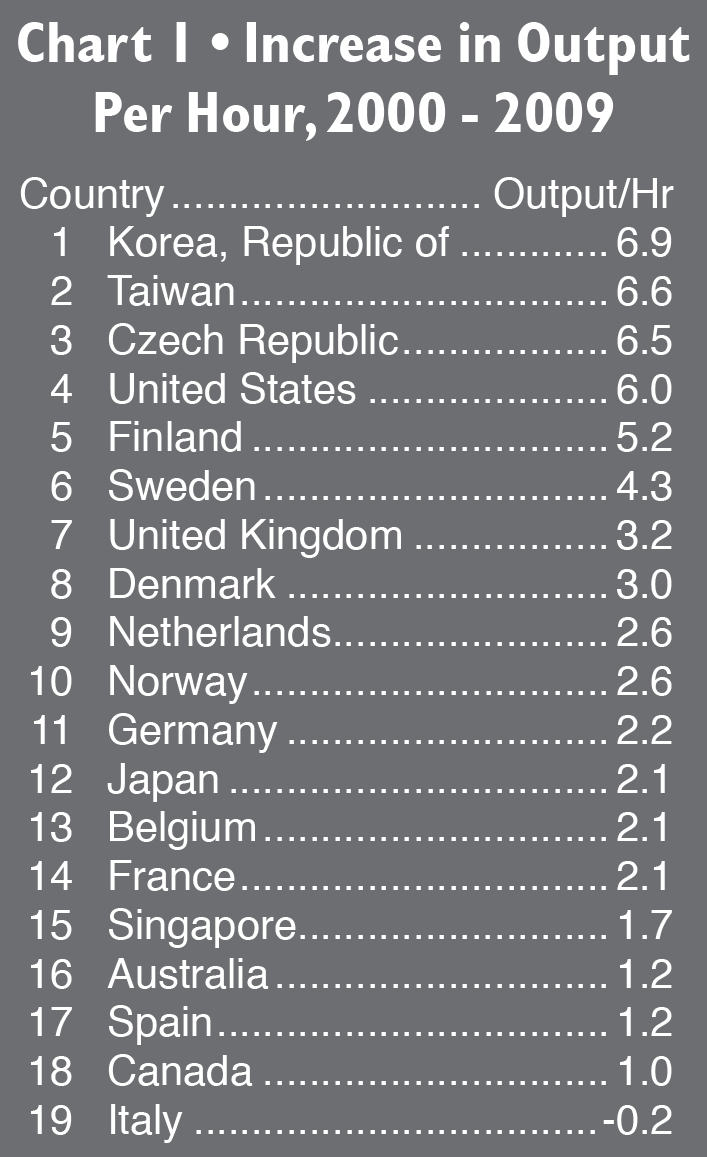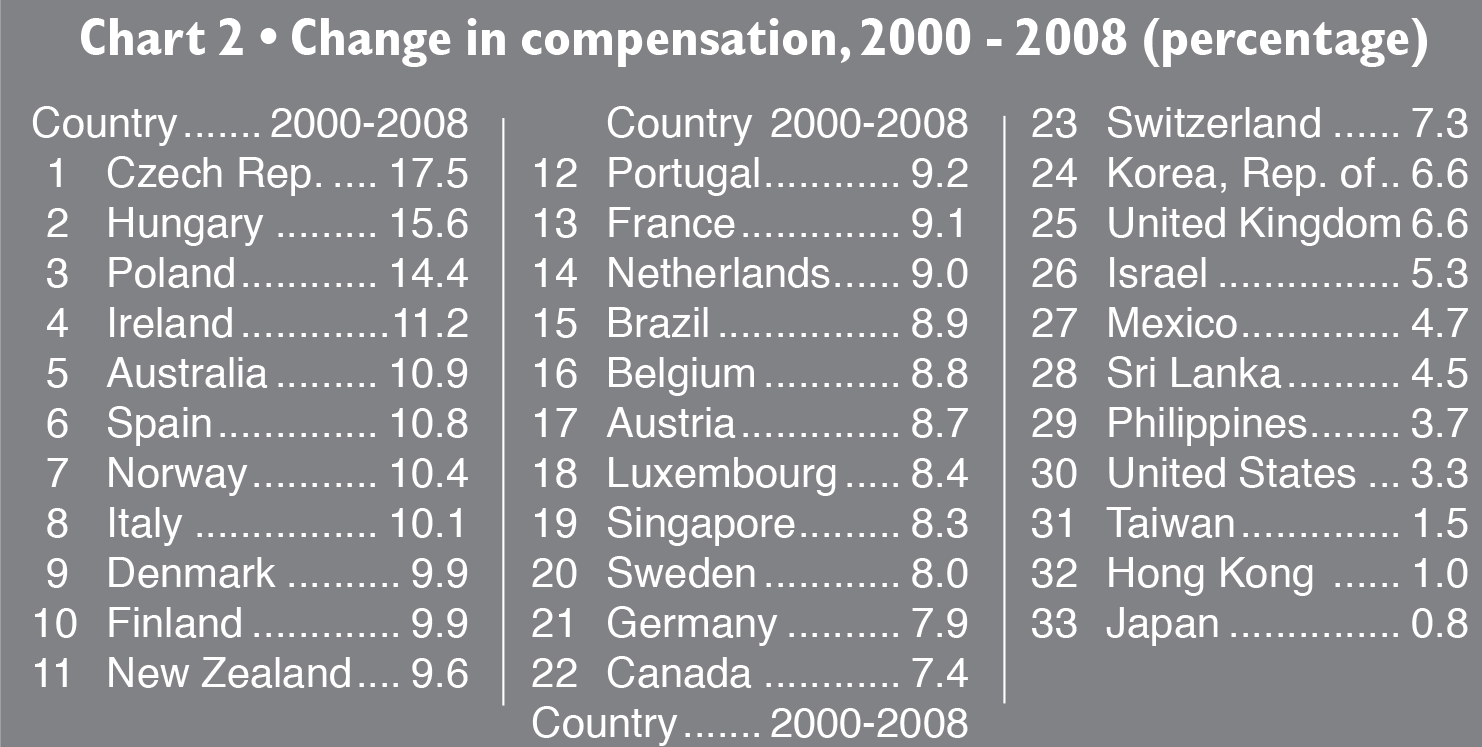From the year 2000 to 2009 the increase in productivity of U.S. workers was 6 percent, the fourth highest in the world.
Every year the U.S. Department of Labor compares the wages, benefits, and productivity of U.S. workers and workers in countries that do a lot of business and trade with the U.S. See http://www.bls.gov/fls/home. htm#comp
Chart 1 right shows the increase in output per hour for the nine years from 2000 to 2009. Workers in Korea, Taiwan, the Czech Republic, and the United States increased their productivity by 6 percent or better.
Chart 2 shows the Change in Compensation which includes wages and benefits from 2000 to 2008.
Czech workers were rewarded with an increase in compensation of 17.5 percent. Korean workers received an increase of 3.3 percent in wages and benefits, which put them at number 24 compared to other countries.
Workers in the United States received one of the lowest increases of 3.3 percent. This put U.S. workers at number 30. Only workers in Taiwan, Hong Kong, and Japan received lower increases in compensation for this eight year period.
More profits for owners
If U.S. workers increased their output by 6 percent but only got a pay increase of 3.3 percent, what happened to the difference? The difference went to the stockholders and owners of U.S. business as higher profits.
The main reason for this is the constant propaganda attack on unions and public ignorance about the real value of unions. This has resulted in a weak labor movement in the U.S. where only a little over 12 percent of the workforce are represented by unions.
Workers get bigger share
In many countries where unions represent over half of the workforce, workers received increases in compensation that were much higher than their increase in productivity.

Norwegian workers, for example, won a 10.4 percent increase in compensation while their productivity increased by only 2.6 percent. Workers in France got a 9.1 percent increase in compensation while their productivity was up by only 2.1 percent.
Norwegian workers earned an average compensation package of $57.18 an hour and French workers received a pay package of $41.94 an hour (see chart on the right side of page 2). U.S. workers earned a much lower average of $32.26 an hour in 2008.
This means stockholders and owners of companies in these countries received a smaller share of the profits, while workers received a larger share of the profits.
Putting more money in the hands of workers is not destroying business nor hurting the economies of these countries. In fact, the increased buying power of workers is why the economies of these countries are strong, healthy, more democratic, and more equitable.


Reasons why unions are good for everyone—continued from page 1
among the workers to uphold the terms of that agreement.
3. Unions help to create a high performance and organized workforce by maintaining a core of senior workers with higher skills and more experience.
Management comes and goes but the long-term success of many businesses often lies in the hands of a core of skilled, senior workers.
Unionized workplaces promote seniority rights which encourages workers to stay with a company. This creates a core of experienced and skilled workers who maintain continuity and pass on their knowledge and skills to new workers.
This leads to increased productivity, innovation, and keeps business competitive.
4. Unions democratize the workplace. This empowers and motivates workers to do a better job.
When workers are unionized, they take ownership of their jobs. They take pride in doing a good job and providing the best service. If workers are treated like employees who can be replaced at any time, they won’t care about the success or future of the business.
5. Unions enforce economic justice and promote best practices in the workplace.
If you don’t like it, quit and work somewhere else. If all workers did this, nothing would be done to correct mistakes and change bad management practices.
With unions, workers stay on the job and try to better the workplace and improve management.
6. Unions spread wealth more evenly, create and enlarge a middle class, and increase internal consumption which drives the economy.
Unions created the middle class by raising workers from poverty to a living wage. Workers spend most of their money on locally produced goods and services. This leads to a growth of small business and a strong and healthy local economy.
This creates jobs and raises the standards of living for all workers.
7. Unions educate workers and train working class leaders in organizational skills, labor history, political economy, and leadership skills.
Unions have been the only source of education and the development of leadership skills for thousands of workers.
8. Unions are essential for a democratic society to remain democratic. Democracy could not exist without unions.
The wealthy in the U.S. have always held the power of big money. Absolute power is the source of dictatorships. Unions moderate the absolute power of management which creates a more just and fair society.
9. Society is most effective with government, employers, and unions.
The world’s most wealthy and successful countries operate by involving business, union, and government in a mutually beneficial and cooperative relationship.
The U.S. is failing because of the anti-union attitude of business and the exclusion of unions from civic life.

